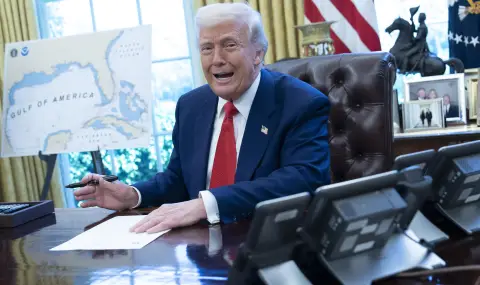Washington woke up yesterday with the highest tariffs on foreign goods in a century, amid warning signals from bond markets that President Donald Trump's attempts to change the face of global trade could trigger a very serious crisis, writes the newspaper. “Washington Post“, BTA reported in the press review.
Hours later, however, Trump made a partial U-turn - he escalated his trade war with China, but reduced many of the tariffs he had just imposed on the rest of the world, the publication points out.
It was a shocking turn of events after Trump's advisers had been arguing for days that he had a plan that nothing could convince him to abandon, the newspaper commented.
Ultimately, however, the chaos in the bond markets forced him to change course, the newspaper writes. “New York Times“.
The newspaper cited four people with direct knowledge of the president's decision, who said that economic turmoil, especially the rapid rise in Treasury yields, led Trump to change his approach late last night and temporarily suspend his “reciprocal” tariffs on most countries for the next 90 days.
Behind the scenes, senior members of Trump's team were concerned about a financial panic that could get out of control and potentially collapse the US economy, the publication said. Treasury Secretary Scott Besant and other members of the president's team, including Vice President J.D. Vance, have pushed for a more structured approach to the trade conflict that focuses on isolating China while sending a message that Trump is serious about addressing trade imbalances.
After his social media announcement of the policy reversal, Trump's team was left in the unenviable position of trying to convince the media that this was the plan all along - a brilliant strategy lifted from the pages of the president's best-selling book "The Art of the Deal," the New York Times reported.
Trump himself blamed the tariff pause on people who, he said, "got a little scared," the British newspaper reported. „Telegraph“.
The chaos in the markets unfolded just days after the president told Americans not to „panic“, the newspaper notes.
The significant change in policy demonstrates that even Trump has to listen to the markets and the wave of warnings from economists about an impending recession and financial crisis, the „Telegraph“ commented.
In the end, no one, least of all consumers or workers, will benefit from the trade war that Trump has unleashed, writes the „Guardian“. However, China may see an opportunity in the current crisis, the newspaper notes.
Trump's sudden announcement of a pause in tariffs for most countries in the world except China may be due to his plan to get other countries to distance themselves from China, the Guardian comments.
However, China is convinced that Trump will come under increasing pressure to rethink his trade war from American billionaires, workers who are watching their pension funds collapse, farmers, employees who fear for their jobs and consumers who are wary of more expensive iPhones. (iPhone) and food, the publication points out.
Above all, Beijing believes that when this storm passes, few will consider the US a reliable economic partner or security guarantor, and China will appear as a more predictable, if not more sympathetic partner, writes “The Guardian“. China expects to suffer losses, but it will not be completely dissatisfied as it watches the US lay the foundations for its own decline, the British publication concludes.
